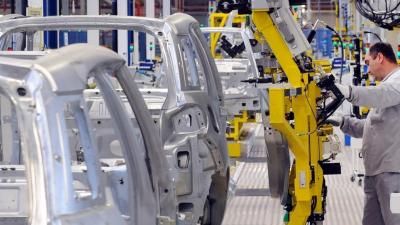
Boeing on aerospace
The design of airplanes has remained largely unchanged for decades—but with new pressures for lighter, greener aviation, a shift in aircraft design and materials is on the horizon.
This page is approximately a 5 minute read
This page was published on

The Global Manufacturing and Industrialisation Summit (GMIS) today held a working group on the sidelines of the first day of the #GMIS2020 Virtual Summit, gathering a cross-section of experts from governments and world-leading organisations to help drive and develop the Global Initiative for Future Industrial Safety, which is aimed at ensuring the safety of workers and the public as manufacturers adopt emerging fourth industrial revolution technologies.
The vision of the Global Initiative for Future Industrial Safety is to create a platform that will coordinate and promote safety cultures through discourse and project implementation. The initiative, a partnership between Lloyd's Register Foundation, the United Nations Industrial Development Organization (UNIDO) and the Global Manufacturing and Industrialisation Summit (GMIS), aims to bridge the gaps between academia, industry, regulators, NGOs and governments.
Participants in the working group included Joaquim Pintado Nunes, Chief of the Labour Administration, Labour Inspection and Occupational Safety and Health Branch, International Labour Organisation (ILO), Irina Sokolova, Head of International Relations Department Federal Environmental, Industrial and Nuclear Supervision Service of Russia, Rostechnadzor, Evgeny Goncharov, Head Kaspersky Lab ICS CERT, JC Sekar, CEO, Acuizen Technologies, Robert Jefferson, Medical Director Occupational Health, International SOS, Michael Tooma, Managing Partner, Australia Clyde & Co, Jane Zavalishina, CEO and President, Mechanica AI, John Marshall, CEO, World Ethical Data Forum, Kate Field, Global Head Health, Safety and Wellbeing, British Standards Institution (BSI), and Nikki McCullough, Global Application Engineering and Regulatory Manager, Personal Safety Division, 3M.
Emerging trends in technology such as big data, cloud computing, robotics, and 3D printing, are changing the industrial environment very quickly. Governments, regulators, and business leaders must work at a similar pace to ensure these new technologies are adopted safely, and keep workers and the public safe in the future. We are excited to be working in partnership with GMIS and UNIDO to develop a new global programme that will promote safety in the future of industry.
Industrial safety can be considered the prevention or elimination of accidents and incidents to achieve a so-called “zero-risk” environment. A society sets out this goal based on their economic, technical, and social contexts. Therefore, the level of minimisation for risk often corresponds to the level of development with regards to technological sophistication and legal capabilities in countries and industrial facilities alike.
Active international cooperation and networks between all sectors and actors helps to facilitate the maximum flow and exchange of information needed in order to achieve greater and more widespread industrial safety. A strategy towards improving industrial safety should foster cooperation and innovation so that no one is left behind.
In response to the rapidly changing landscape of manufacturing, not least because of the ongoing COVID-19 pandemic, countries adopt various approaches to keep up with new industrial developments. Safety is not always the main priority and may lead to an increase in workplace related accidents and maybe even disease, if not properly addressed. A global, integrated approach to safety is therefore necessary to ensure that the promises of Industry 4.0 technologies are fulfilled and deliver economic gains, but in a safe and secure manner that puts workers’ health upfront. UNIDO is delighted to partner with Lloyd’s Register Foundation and GMIS to put safety at the heart of industry 4.0.
The focus of the working group session was to gather perspectives from leading experts on what the major industrial safety challenges will be in the future. Participants considered ways to ensure safety at work amid the rapid introduction of fourth industrial revolution technologies, the biggest safety challenges facing Industry 4.0, and discussed the priorities of the new global initiative to improve and promote safety in the future of industry. The findings will then form the basis for further discussion on ways to launch the programme globally and help establish a global network of partnerships to amplify its reach and impact.
The Fourth Industrial Revolution (4IR) is driving a significant increase in the level of autonomy in manufacturing facilities. Human operators increasingly work in close collaboration with machines and robots, which represents a significant evolutionary step in factory automation but also introduces new safety challenges. These challenges cannot be overcome by following the traditional systems and frameworks since technology requires us to define a new approach towards ensuring safety in the workplace. Therefore, we need to consider revising the existing safety regulatory frameworks to ensure its alignment with the Fourth Industrial Revolution, and we believe that this joint initiative with UNIDO and Lloyd’s Register Foundation is an important step forward.
The Global Manufacturing and Industrialisation Summit is a joint initiative by the United Arab Emirates and the United Nations Industrial Development Organization (UNIDO). Under the theme – Glocalisation: Towards Sustainable and Inclusive Global Value Chains, the third edition of the Summit (#GMIS2020) is taking place on September 4-5, 2020, and has gathered a cross-section of close to 100 global leaders from the world’s public and private sector to participate across more than 20 virtual sessions to discuss pathways to accelerate the role of fourth industrial revolution (4IR) technologies to build more resilient global value chains and restore prosperity in a post-pandemic world.
GMIS 2020 is a cross-section of thought-leaders from public and private sectors, academia, and NGOs, developing and developed countries, to discuss and shape the future of manufacturing. The agenda is set to drive dynamic discussions and debates around the challenges and opportunities associated with harnessing the power of Fourth Industrial Revolution (4IR) technologies, to build resilient global value chains, restore power to the global economy, and promote Inclusive and Sustainable Industrial Development, amid the crisis that has engulfed the world. For more information, visit their website.